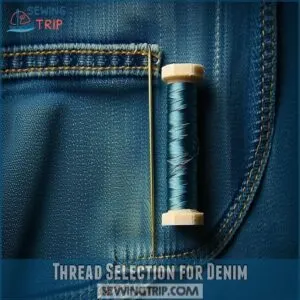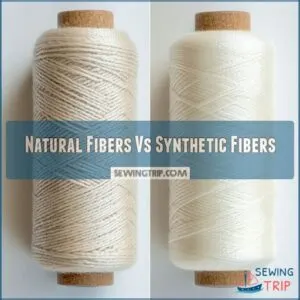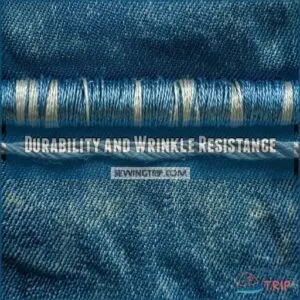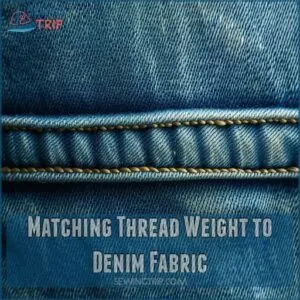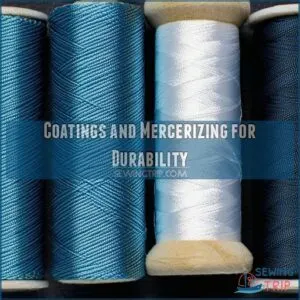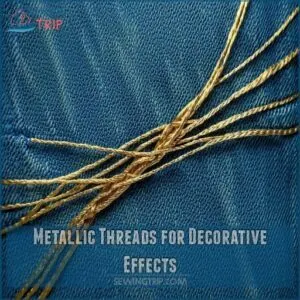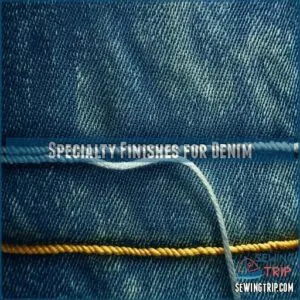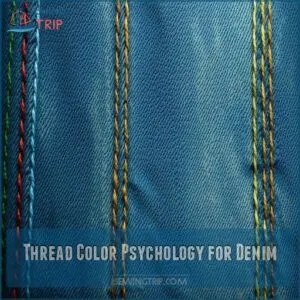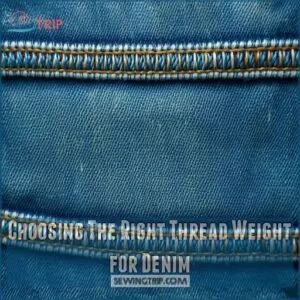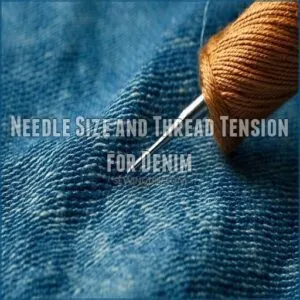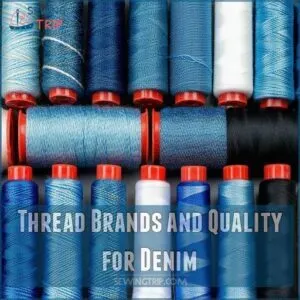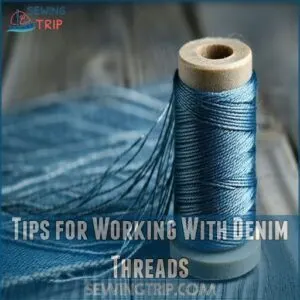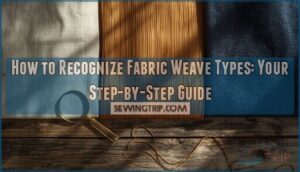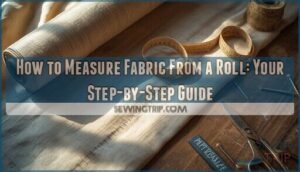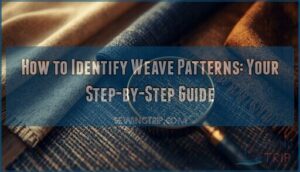This site is supported by our readers. We may earn a commission, at no cost to you, if you purchase through links.
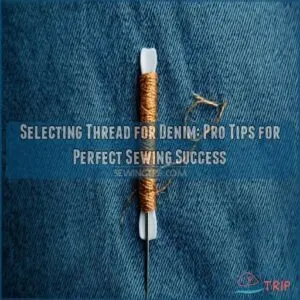 When selecting thread for denim, you’ll want to choose a powerhouse that matches your fabric’s personality.
When selecting thread for denim, you’ll want to choose a powerhouse that matches your fabric’s personality.
Polyester threads are your go-to for durability, offering high tensile strength that’ll outlast your favorite jeans. Consider cotton-wrapped polyester for a perfect blend of softness and resilience.
Match your thread weight to your denim’s thickness—heavier threads (size 40-50) for heavyweight denim, lighter for thinner fabrics.
Don’t skimp on quality; reputable brands like Gutermann guarantee professional-looking seams that won’t unravel mid-stride.
Pro tip: test your thread tension on scrap fabric first, and you’ll be stitching like a denim pro in no time.
Table Of Contents
- Key Takeaways
- Thread Selection for Denim
- Thread Fiber Types for Denim
- Matching Thread Weight to Denim Fabric
- Thread Finishes and Treatments for Denim
- Thread Color Psychology for Denim
- Choosing The Right Thread Weight for Denim
- Needle Size and Thread Tension for Denim
- Thread Brands and Quality for Denim
- Tips for Working With Denim Threads
- Frequently Asked Questions (FAQs)
- Conclusion
Key Takeaways
- You’ll want to match your thread’s weight and fiber type to your denim’s thickness and durability requirements, choosing polyester or cotton-wrapped polyester threads for maximum strength.
- Your thread color isn’t just functional—it’s a strategic design element that can create visual harmony or bold contrast, so choose wisely based on color wheel principles and the emotional impact you’re aiming for.
- Don’t skimp on thread quality; invest in reputable brands like Gutermann or Mettler that offer high tensile strength and will prevent seam failures through countless washes and wears.
- You’ll need to pay close attention to technical details like needle size (90-100 for heavyweight denim), thread tension, and machine settings to guarantee professional-looking stitches that won’t break or pucker.
Thread Selection for Denim
When sewing denim, choosing the right thread can make or break your project’s durability and appearance.
You’ll want to select a thread that’s strong enough to withstand the heavy-duty demands of this rugged fabric while matching its unique characteristics and aesthetic.
High Tensile Strength Requirements
Regarding denim, tensile strength isn’t just a technical term—it’s your seam’s lifeline.
Your thread needs to withstand serious stress without breaking, especially in high-wear areas.
Heavyweight denim demands threads that can handle intense stitch density and constant movement.
Choosing a thread with superior tensile strength guarantees your garments won’t fall apart after a few wears, giving you confidence in every stitch.
Polyester Vs Cotton-Wrapped Polyester Threads
After tackling high tensile strength, let’s unravel the thread showdown between polyester and cotton-wrapped polyester.
Polyester threads offer killer stretch resistance and durability that’ll make your denim projects sing.
Cotton-wrapped polyester? They’re the smooth operators, blending natural softness with synthetic strength.
Your thread choice isn’t just about looks—it’s about creating denim that can take a beating and look awesome doing it.
Thread Weight and Denim Thickness
If you’ve been working with cotton-wrapped polyester threads, now’s the time to match your thread weight to denim thickness like a pro.
Heavyweight denim demands thicker threads (size 40-50) for rock-solid seams, while lighter fabrics need slimmer options.
Stitch density matters – thicker threads boost seam strength, preventing those frustrating blowouts that can turn your favorite jeans into sad, split memories.
Color Matching for Aesthetic Integration
In the denim crafting universe, thread color is your artistic signature. Master your color matching with these pro tips:
- Understand color psychology for emotional impact, keeping in mind that colors can be used to create harmony by using the color wheel to find complementary, analogous, or monochromatic color schemes for a cohesive look like monochromatic color schemes.
- Match thread to denim shade for seamless integration
- Consider plum or turquoise for bold statements
- Follow 2024-2025 color trends in thread selection
Your thread’s color is the secret weapon that transforms ordinary denim into a statement piece.
Thread Fiber Types for Denim
In denim sewing, you’ll want to understand the pros and cons of natural and synthetic thread fibers before making your selection.
Your thread choice can make or break your project, so it’s vital to know how different fiber types impact your garment’s strength, comfort, and overall performance.
Natural Fibers Vs Synthetic Fibers
When choosing threads for denim, you’ll quickly realize natural and synthetic fibers aren’t created equal.
Cotton brings breathability and a classic feel, while polyester delivers rock-solid durability.
Your fiber choice impacts everything from cost to performance.
Think of it like picking your denim’s perfect dance partner – each fiber has its own groove, strengths, and personality that can make or break your sewing project.
Breathability and Moisture Absorption
With breathability as your secret weapon, cotton threads breathe life into denim‘s comfort zone.
Natural fibers transform your fabric’s moisture management, creating a microclimate that keeps you cool and dry.
Cotton threads actively wick away sweat, ensuring air circulation through the fabric’s weave.
When searching for the right thread, consider exploring cotton denim thread options here for cotton thread.
Your denim becomes more than just clothing – it’s a breathable, adaptive second skin that moves with you.
Durability and Wrinkle Resistance
After soaking up cotton’s breathable charm, you’ll want threads that stand up to denim’s tough challenges.
Synthetic fibers like polyester bring unbeatable durability and wrinkle resistance to your sewing game.
They’ll keep your heavyweight denim thread strong, preventing seam breakdown and maintaining fabric resilience. No more worrying about shrinkage or weak stitches – these threads are your denim’s best defense. Synthetic fibers like polyester are denim’s best defense.
Matching Thread Weight to Denim Fabric
When you’re working with denim, choosing the right thread weight can make or break your sewing project.
You’ll want to match your thread’s thickness to your denim’s weight, ensuring strong seams that’ll stand up to wear and tear.
Thread Weight and Fabric Compatibility
Nailing the right thread weight for denim is like finding your perfect pair of jeans – it’s all about the fit. Your thread should match your fabric’s personality, creating a seamless connection that screams professional craftsmanship.
- Match thread weight to denim thickness
- Align thread weight with fabric density
- Test thread strength before committing
- Check thread tension compatibility
- Perform fabric thread strength tests
Your denim deserves nothing less than thread perfection.
Sewing Machine Compatibility
Consult your sewing machine’s manual for the inside scoop on thread and needle compatibility.
Check the recommended needle sizes that match your denim’s weight—typically 90-100 for heavyweight fabrics.
Adjust your bobbin thread and tension settings carefully, ensuring smooth sailing through those thick layers. Your machine’s sweet spot will make all the difference in your denim project’s success.
Preventing Breakage and Puckering
Nearly every denim project can go sideways without the right thread tension and needle size.
To guarantee you’re getting the right thread for the job, choose from a variety of denim thread weights. Prevent breakage by matching your thread strength to denim’s heavyweight fabric – thicker threads (size 40-50) work best.
Prepare your fabric carefully and choose high-quality threads that won’t snap under pressure.
Adjust your machine’s tension to keep stitches smooth and secure, avoiding those pesky puckers.
Thread Finishes and Treatments for Denim
You’ll want to understand how thread finishes can transform your denim sewing project from ordinary to extraordinary.
Explore the range of coatings, mercerizing, and specialty treatments.
That’ll give your threads the durability and style your denim deserves.
Coatings and Mercerizing for Durability
Want your denim stitches to stand the test of time? Thread coatings and mercerized cotton are your secret weapons.
Understanding the properties of different thread fibers, such as natural fibers like cotton, can also help you choose the perfect thread for your denim project.
These finishes boost thread strength, giving your project a professional edge.
Mercerized threads shine with extra luster, while specialized coatings enhance durability.
You’ll transform ordinary thread into a powerhouse that’ll keep your denim looking sharp and holding strong through countless washes and wears.
Metallic Threads for Decorative Effects
Ready to add some sparkle to your denim? Metallic threads can transform your project from basic to dazzling, but they’re not your average sewing companion. Before you start, know the tricks to make these shimmery strands work their magic.
- Choose metallic threads designed for decorative stitching
- Test tension settings on scrap denim first
- Use a larger needle to prevent thread breakage
- Select colors that complement your denim’s wash
Specialty Finishes for Denim
After playing with metallic threads that shimmer like desert mirages,
you’ll want to explore specialty denim thread finishes that amp up your sewing game.
Denim thread coatings add muscle to your seams, while mercerized threads bring a killer sheen that makes your stitches pop. These specialty finishes aren’t just about looks – they’re about creating threads that can take a beating and look good doing it. Denim thread coatings and mercerized threads are great options.
Thread Color Psychology for Denim
When you’re choosing thread for your denim project, you’ll want to think about more than just color.
The right thread color can transform your denim from simple stitching to a statement of style, creating visual harmony or bold contrast.
You’re actually selecting an emotional palette for your garment.
This speaks volumes about your craftsmanship.
Color Wheel Principles
Master the color wheel’s secrets to elevate your denim thread game.
Understanding color psychology transforms your projects from basic to brilliant.
Think of the wheel as your artistic compass – guiding you through complementary and analogous hues that’ll make your stitches pop.
Your thread isn’t just functional; it’s a strategic design element that speaks volumes about your creative vision.
Complementary and Harmonious Colors
With color theory as your compass, select thread colors that dance alongside your denim’s unique personality.
Complementary colors create bold visual statements—imagine navy denim with vibrant orange topstitching that pops.
Harmonious colors, like various blue shades, weave a subtle, sophisticated narrative.
Your thread can either whisper or shout, transforming a simple garment into a canvas of color expression.
Emotional Impact of Thread Color
Transform your denim project’s vibe by strategically selecting thread colors that speak volumes about your emotional intentions.
Thread color psychology can dramatically elevate your sewing experience:
- Red threads spark energy and passion
- Blue threads create calm and stability
- Green threads suggest growth and harmony
- Neutral tones convey sophistication and versatility
Your thread’s hue isn’t just decorative—it’s a powerful storytelling tool that can dramatically shape your denim’s mood and visual narrative.
Choosing The Right Thread Weight for Denim
When you’re sewing denim, choosing the right thread weight can make or break your project’s durability and appearance.
You’ll want to match your thread thickness to your denim’s weight, using heavier threads for main seams and lighter threads for construction details.
To guarantee your garment looks professional and stands up to wear.
Heavier Thread for Main Seams
Beef up your denim projects with heavyweight topstitch thread that screams durability.
Regarding main seams, thickness matters more than you might think.
Check out this quick guide to thread selection:
| Thread Weight | Seam Type | Recommended Use |
|---|---|---|
| 30-40 | Main Seams | High-stress areas |
| 50 | Topstitching | Visible, decorative |
| 18-24 | Heavy Duty | Thick denim panels |
Nail your thread tension and needle size to guarantee those seams stay rock-solid.
Lighter Thread for Construction Seams
Sometimes, lighter threads (size 30 or 35) become your secret weapon for construction seams in denim projects.
You’ll want to choose a thread that complements your main seam thread while maintaining stitch strength and fabric weight considerations.
Carefully select threads that provide reliable seam integrity without overwhelming the delicate areas of your denim garment. This is crucial for reliable seam integrity.
Needle Size and Thread Tension for Denim
When sewing denim, you’ll want to master two essential elements: choosing the right needle size and adjusting your thread tension perfectly.
A larger needle (size 90-100) and carefully calibrated tension will help you sail through thick denim fabrics without breakage or loose stitches.
Needle Size for Easy Penetration
When wrestling with denim, your needle size can make or break your sewing project.
For heavyweight denim, grab a robust size 90-100 needle that’ll slice through thick fabric like a hot knife through butter.
To complement your needle choice, consider exploring various denim thread sizes for the perfect match.
Smaller needles struggle and snap, leaving you with frustrating repairs.
Match your needle to your denim’s weight for smooth, uninterrupted stitching that’ll have you sewing like a pro.
Thread Tension for Preventing Loose Stitches
In denim sewing, thread tension can make or break your project.
To achieve the perfect stitch, you need to select the right needle size, such as a size 90/14 for standard denim, as highlighted in denim sewing tips.
Loose stitches spell disaster, causing frustration and potential wardrobe malfunctions.
Your machine’s tension dial is your secret weapon against stitch chaos. Carefully balance thread settings to lock down each seam, preventing unsightly gaps and ensuring your denim creation looks professional and stays together through countless wears.
Adjusting Thread Tension for Denim
The art of thread tension can make or break your denim project‘s success.
Master your machine’s settings with these key steps:
- Start with a medium tension setting
- Test on a denim scrap piece first
- Adjust incrementally for balanced stitches
- Watch for thread breakage or puckering
Your machine’s sweet spot prevents frustrating seam failures and guarantees professional-looking results every time.
Thread Brands and Quality for Denim
When you’re sewing denim, choosing the right thread can make or break your project’s durability and appearance.
High-quality threads from reputable brands like Gutermann, Coats & Clark, and Mettler will guarantee your stitches stay strong and look professional, even after countless washes and wearing.
Reputable Brands for Denim Threads
Picking the right thread brand can make or break your denim project.
Your stitching success hinges on choosing wisely among top manufacturers.
Check out this quick brand comparison to improve your sewing potential:
| Brand | Denim Strength | Price Point | User Rating | Special Feature |
|---|---|---|---|---|
| Gutermann | High | Medium | 4.7/5 | Smooth finish |
| Coats & Clark | Medium-High | Low | 4.5/5 | Affordable |
| Mettler | Very High | High | 4.8/5 | Precision |
| Tex 40 | High | Low-Medium | 4.6/5 | Durability |
| Superior Threads | Very High | High | 4.9/5 | Color variety |
High-Quality Threads for Durability
When crafting denim masterpieces, your thread is your secret weapon for longevity.
Top-tier brands like Gutermann and Mettler offer threads that’ll outlast your favorite jeans, combining exceptional strength with reliable performance.
For the best results, selecting the right thread type for denim projects is essential, such as using sturdy, abrasion-resistant jeans thread options.
Investing in high-quality threads might cost more upfront, but they’ll save you headaches down the road, ensuring your denim projects remain rock-solid through countless washes and wears.
Low-Quality Threads and Potential Issues
Watch out for budget threads that’ll sabotage your denim project faster than you can say "wardrobe malfunction".
Low-quality threads are notorious for breaking mid-stitch, snagging like velcro, and splitting at the worst moments.
They’ll leave your stitches looking uneven and your color fading faster than summer memories.
Invest in thread strength – your denim deserves better than a cheap shortcut.
Tips for Working With Denim Threads
When you’re working with denim threads, proper handling and care can make or break your sewing project.
You’ll want to master thread storage, maintenance, and troubleshooting techniques.
to guarantee your denim garments look professional and stand up to wear and tear.
Thread Handling and Storage
After choosing top-quality threads, smart storage keeps your denim project’s threads ready to roll.
Stash spools in clear, sealed containers away from direct sunlight to prevent color fading and fiber degradation.
Keep threads dust-free and organized, hanging vertically or laying flat.
Your thread’s longevity depends on how you protect it between sewing sessions.
Thread Maintenance and Troubleshooting
Every sewer knows thread maintenance can make or break your denim project, turning potential frustration into fabric finesse.
Mastering thread care guarantees your stitches stay strong and your machine runs smoothly.
- Banish thread breakage like a sewing ninja
- Dodge needle jams with surgical precision
- Tame unruly thread tension with confidence
- Eliminate lint buildup for spotless seams
- Document your machine’s thread settings religiously
Frequently Asked Questions (FAQs)
What thread should I use for denim?
Just like a trusty sidekick, polyester-wrapped thread is your denim’s best friend.
Choose a medium to heavy-weight thread (40-50 weight) for strong seams.
strong seams that’ll withstand daily wear and keep your jeans looking sharp and reliable.
What is the best stitch setting for denim?
For denim, set your machine to a longer stitch length (3-4mm) and use a straight stitch with reinforced stitching.
Choose a heavy-duty needle.
Adjust tension to prevent puckering, ensuring strong, clean seams that’ll withstand your toughest wear.
What weight thread for hemming jeans?
When hemming jeans, you’ll want a medium-weight polyester thread (size 40 or 50) that’ll stand up to wear and tear. It’ll give your hem the strength to survive countless washes and adventures.
What is the best thread tension for jeans?
Cracking the code of jean thread tension isn’t rocket science.
Aim for medium-high tension (around 4-5 on most machines),
adjusting slightly tighter for heavyweight denim to prevent loose, sloppy stitches that’ll make your jeans look amateur.
How to repair a torn denim seam easily?
Grab matching thread and a denim patch.
Pin the patch inside your jeans, covering the torn seam.
Stitch around the edges using a machine or hand-sew with small, tight stitches.
Trim excess thread for a clean, quick fix.
Can I use decorative threads on denim?
Free your inner denim rebel!
You’ll definitely rock decorative threads on denim.
Choose heavyweight polyester or topstitching thread, use a larger needle, and experiment with creative techniques like sashiko for stunning, durable embellishments.
What causes thread breakage when sewing denim?
When you’re battling thread breakage on denim, you’ll want to check your needle’s condition.
Dull or bent needles can quickly derail your sewing project, causing frustrating breaks.
You should also check tension settings.
Improper tension can quickly derail your sewing project, causing frustrating breaks.
Finally, check thread quality.
Low-quality thread can quickly derail your sewing project, causing frustrating breaks.
How do I prevent thread bunching when?
Yo, time-traveling seamstress! Adjust your machine’s tension before tackling denim.
Match needle size to fabric thickness, and make certain proper threading.
Hold thread tails when starting to prevent those pesky thread tangles underneath your stitches.
Is hand sewing denim possible with regular?
You’ll need sturdy cotton or polyester thread and a sharp, thick needle for hand sewing denim.
Take your time with small, tight stitches.
Use a thimble to protect your fingers from the tough fabric’s resistance.
Conclusion
Worried thread selection seems overwhelming? Don’t sweat it!
Selecting thread for denim isn’t rocket science—it’s about understanding your fabric’s personality.
By matching thread weight, fiber type, and quality to your denim’s unique characteristics, you’ll create professional-looking garments that last.
The right thread can transform your sewing project from amateur to artisan.
Trust your skills, test your tension, and watch your denim creations come to life with confidence and style.

